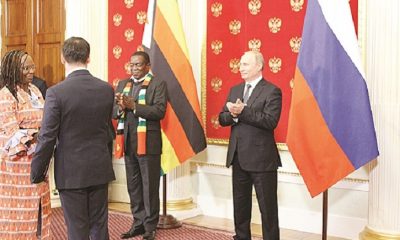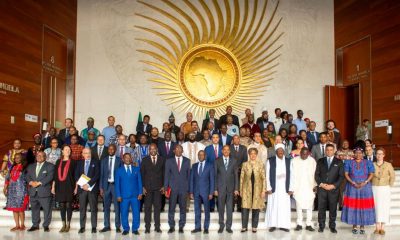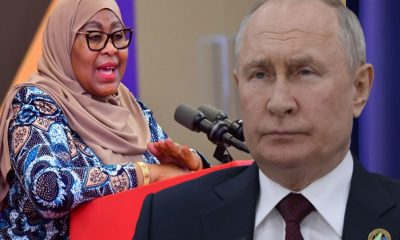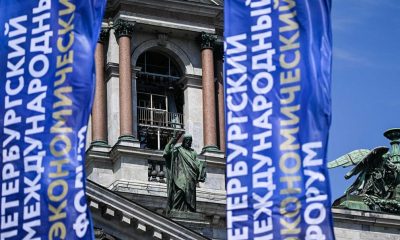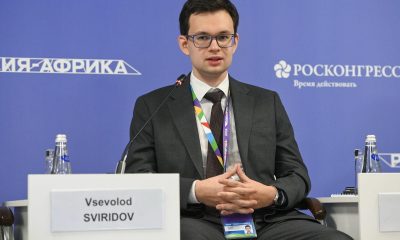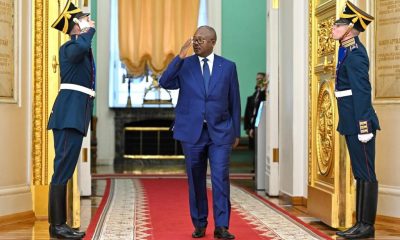World
Russia Assures Equatorial Guinea Strong Trade, Economic Ties
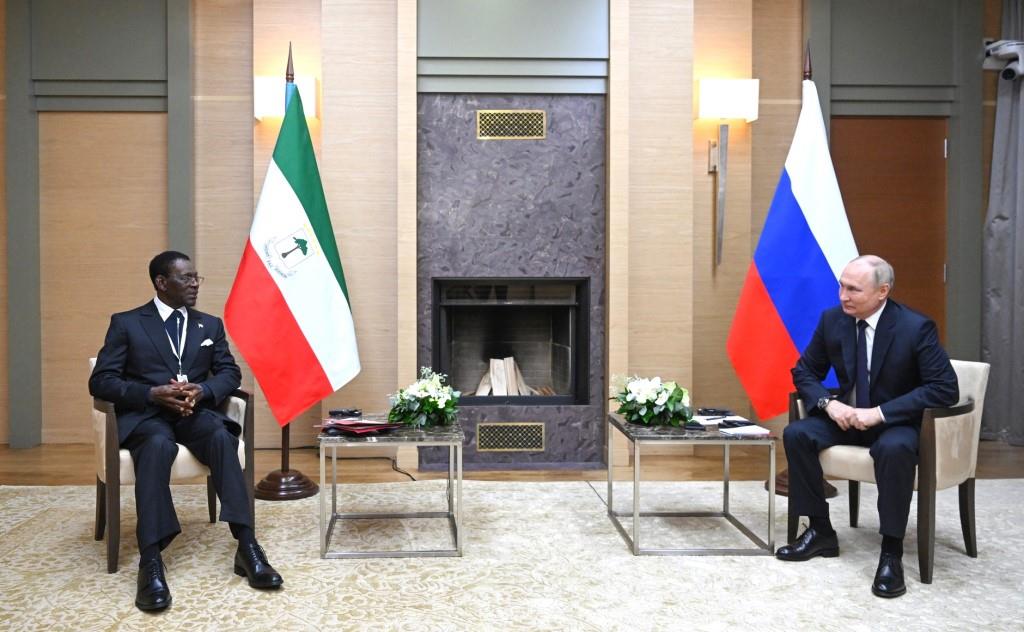
By Kestér Kenn Klomegâh
Russian President, Mr Vladimir Putin, has held talks with the Equatorial Guinean President, Mr Teodoro Obiang Nguema Mbasogo, who was in Moscow on an official working visit.
The visit could be characterized as historic and interpreted as one major step to broadly review the political situation in the Central African region, and specifically assess the prospects for deepening bilateral cooperation between Russia and Equatorial Guinea.
As the current rotating Chairman of the Economic Community of Central African States (ECCAS), the regional economic bloc uniting Cameroon, the Central African Republic, Chad, the Republic of Congo, Equatorial Guinea, Gabon, and São Tomé and Principe, Teodoro Obiang Nguema’s task, among others, is to oversee political governance and developments relating to regional integration within the seven-nation bloc.
Teodoro Obiang Nguema was at the residence Novo-Ogaryovo on November 2 as part of his scheduled trip to the Russian capital and held talks with President Putin.
According to official reports from the Kremlin’s website, the negotiations began with a tete-a-tete conversation between the leaders. Then international consultations continued in an expanded format with the participation of members of the delegations of the two countries, Russia and Equatorial Guinea.
According to Putin, Russia and Equatorial Guinea have many overlapping mutual interests. Russia’s relations with Africa are developing very intensively, as evidenced by the results of the Russia-Africa summit held in St. Petersburg.
During that summit, delegates from Equatorial Guinea held a number of serious meetings with Russian oil and gas and mining companies. But now, for Russia and Equatorial Guinea, the other priority is to focus on developing trade and economic ties.
The interest and opportunities for developing economic relations are good, as Russian companies look forward to working in Africa.
“We also talked about security issues, about relations with the countries of the region. We agreed on what and how we will do further in this area,” Putin underscored in his speech.
Taking his turn, Teodoro Obiang Nguema expressed appreciation for the invitation and further emphasized the fact that the world is facing enormous challenges in the area of international security. Obviously, Russia is a traditional and strategic partner of Equatorial Guinea and the African continent.
“And we must keep in mind that Russia contributed and fought for the liberation of African states to achieve political independence. This struggle should not be forgotten. Therefore, at the moment, especially at the UN level, when they want to take certain measures, Equatorial Guinea always votes against such proposals,” the Equatorial Guinean President told Putin.
Clearly, Africa is being heavily exploited at the moment. Africa needs to develop. More than a century has passed since Africa achieved independence, but the entire continent is still underdeveloped economically. Not because Africa cannot develop but because the natural resources are being used – are being exploited. And this hinders Africa’s development, he explained and added that, “Therefore, when Russia promises to send its businessmen to help Africa develop, we can only say: let them come. And Equatorial Guinea accepts this proposal with satisfaction.”
In addition, the Russian government has decided to reopen its embassy in Equatorial Guinea. Practical cooperation between Russia and Equatorial Guinea will then receive a fresh impetus, and facilitate the expansion of cooperation.
There are signs that Equatorial Guinea intends to expand defence cooperation with Russia. The implication is that this will lead to political development not only in Equatorial Guinea but also in Central Africa as the region faces security challenges in the Gulf of Guinea.
In addition, Africa is currently suffering from the activities of terrorists. Russia, as a key partner of Africa, must monitor the security of African countries so that they continue to fight against their weak level of development.
From experts’ analysis, Russia’s relations with Equatorial Guinea are only seeing real development now despite previously concluded agreements in various fields. For example, there have been no dynamics in trade turnover over the past 20 years, Nikita Panin, program coordinator at the Russian International Affairs Council and researcher at the Centre for African Studies at the Higher School of Economics (HSE University), told Financial Izvestia. According to him, the sides may have touched on cooperation in healthcare and education because students from Equatorial Guinea are already attending universities in Russia.
Later, the delegation had wider separate discussions. The agenda included the state and prospects of bilateral cooperation in various fields, as well as issues of developing Russia’s relations with the countries of the Central African region, taking into account Equatorial Guinea’s chairmanship of the Economic Community of Central African States (ECCA). But seemingly, Russia might not be keen on forging closer cooperation with the regional bloc as this particular organization is rather too weak compared to other subregional groups. Worse, these central African countries have sharply differing approaches to international agenda, further economic development and even disparities in the political environment.
Participants in Russian-Equatoguinean negotiations (in expanded format) were listed as follows: Teodoro Obiang Nguema Mbasogo – President of the Republic of Equatorial Guinea, Simeon Oiono Esono Angué – Minister of Foreign Affairs, International Cooperation and Diaspora Affairs of the Republic of Equatorial Guinea, and Alejandro Evuna Ovono Asangono – Minister of State for Special Assignments under the Administration of the President of the Republic of Equatorial Guinea.
Job Obiang Esono Mbengono – Minister for the Civil Service Cabinet under the Administration of the President of the Republic of Equatorial Guinea, Victoriano Bibang Nsue Okomo – Minister of National Defense of the Republic of Equatorial Guinea, Teodoro Biyogo Nsue Okomo – Assistant to the President of the Republic of Equatorial Guinea for Protocol Issues and Luciano Nkogo Ndong Ayekaba – Ambassador Extraordinary and Plenipotentiary of the Republic of Equatorial Guinea to the Russian Federation.
From the Russian side: Sergey Viktorovich Lavrov – Minister of Foreign Affairs of the Russian Federation, Alexey Logvinovich Overchuk – Deputy Prime Minister of the Russian Federation, Dmitry Sergeevich Peskov – Deputy Head of the Administration of the President of the Russian Federation, and Press Secretary of the President of the Russian Federation and Yuri Viktorovich Ushankov – Assistant to the President of the Russian Federation.
Nikolay Grigorievich Shulginov – Minister of Energy of the Russian Federation, Dmitry Evgenievich Shugaev – Director of the Federal Service for Military-Technical Cooperation, Alexander Vasilievich Fomin – Deputy Minister of Defense of the Russian Federation, Sergey Nikolaevich Gorkov – General Director of JSC Rosgeologiya and Alexander Alexandrovich Mikheev – General Director of JSC Rosoboronexport.
The two countries signed business agreements, including a declaration of intent on partnership in the field of mining. In many respects, both parties’ lengthy discussions highlighted the teething insecurity arising from political opposition and militant groups and development challenges facing countries in the region.
Russia has severally expressed concern over the growing diplomatic activity, examined possible ways to work collectively for economic development and to improve the lack of large-scale infrastructure to position the private sector as the primary engine for job creation.
At the meeting both parties identified commitment as the fundamental step along the path to the development in Equatorial Guinea, its regional integration which is essential for the economies of that zone in central Africa.
Teodoro Obiang Nguema currently heads the Economic Community of Central African States (ECCAS), a regional bloc that includes members such as Cameroon, the Central African Republic, Chad, the Republic of Congo, Equatorial Guinea, Gabon, and São Tomé and Principe.
Teodoro Obiang Nguema Mbasogo is an Equatoguinean politician and former military officer who has served as the second president of Equatorial Guinea since the overthrow of his uncle on August 3, 1979, in a bloody coup d’état. He is the longest-serving president of any country ever and the second-longest consecutively-serving current non-royal national leader in the world (after Paul Biya in Cameroon).
Teodoro Obiang Nguema’s rule was at first considered more humane than that of his uncle. By some accounts, however, it has become increasingly brutal, and has bucked the larger trend toward greater democracy in Africa. According to most domestic and international observers, he leads one of the most corrupt, ethnocentric and repressive regimes in the world.
Several international groups have called for Teodoro Obiang Nguema to observe the following:
* to increase fiscal transparency and accountability by publishing all government revenues, conducting and publishing annual audits of government accounts, including those abroad, and forcing officials to declare assets.
* disclose natural resource revenues, greatly increase spending to alleviate poverty, uphold political freedoms and rights
* to allow judicial practices to meet international standards and cease harassing and hindering his critics and further to allow foreign inspectors and groups to travel freely, unhindered and unharassed.
The constitution grants Obiang sweeping powers, including the power to rule by decree. The economy of this small nation continued to struggle under President Obiang, with the country depending mostly on foreign aid to pay its bills. This changed in 1995 when Exxon-Mobil, the American oil giant, discovered oil in the country. Massive offshore discoveries over the past decade have boosted oil to about 380,000 barrels per day, ranking Equatorial Guinea behind only Nigeria and Angola among Sub-Saharan African producers.
In Equatorial Guinea, despite its natural resources, the majority of the estimated 1.5 million population wallows in abject poverty. Subsistence farming predominates, with shabby infrastructure in the country. Equatorial Guinea consists of two parts, an insular and a mainland region. Equatorial Guinea is the third-largest oil producer in sub-Saharan Africa.
World
African Visual Art is Distinguished by Colour Expression, Dynamic Form—Kalalb

By Kestér Kenn Klomegâh
In this insightful interview, Natali Kalalb, founder of NAtali KAlalb Art Gallery, discusses her practical experiences of handling Africa’s contemporary arts, her professional journey into the creative industry and entrepreneurship, and also strategies of building cultural partnership as a foundation for Russian-African bilateral relations. Here are the interview excerpts:
Given your experience working with Africa, particularly in promoting contemporary art, how would you assess its impact on Russian-African relations?
Interestingly, my professional journey in Africa began with the work “Afroprima.” It depicted a dark-skinned ballerina, combining African dance and the Russian academic ballet tradition. This painting became a symbol of cultural synthesis—not opposition, but dialogue.
Contemporary African art is rapidly strengthening its place in the world. By 2017, the market was growing so rapidly that Sotheby launched its first separate African auction, bringing together 100 lots from 60 artists from 14 foreign countries, including Algeria, Ghana, Mali, Nigeria, Senegal, and others. That same year during the Autumn season, Louis Vuitton Foundation in Paris hosted a major exhibition dedicated to African art. According to Artnet, sales of contemporary African artists reached $40 million by 2021, a 434% increase in just two years. Today, Sotheby holds African auctions twice a year, and in October 2023, they raised $2.8 million.
In Russia, this process manifests itself through cultural dialogue: exhibitions, studios, and educational initiatives create a space of trust and mutual respect, shaping the understanding of contemporary African art at the local level.
Do you think geopolitical changes are affecting your professional work? What prompted you to create an African art studio?
The international context certainly influences cultural processes. However, my decision to work with African themes was not situational. I was drawn to the expressiveness of African visual language—colour, rhythm, and plastic energy. This theme is practically not represented systematically and professionally in the Russian art scene.
The creation of the studio was a step toward establishing a sustainable platform for cultural exchange and artistic dialogue, where the works of African artists are perceived as a full-fledged part of the global cultural process, rather than an exotic one.
To what extent does African art influence Russian perceptions?
Contemporary African art is gradually changing the perception of the continent. While previously viewed superficially or stereotypically, today viewers are confronted with the depth of artistic expression and the intellectual and aesthetic level of contemporary artists.
Portraits are particularly impactful: they allow us to see not just an abstract image of a “continent,” but a concrete personality, character, and inner dignity. Global market growth data and regular auctions create additional trust in African contemporary art and contribute to its perception as a mature and valuable movement.
Does African art reflect lifestyle and fashion? How does it differ from Russian art?
African art, in my opinion, is at its peak in everyday culture—textiles, ornamentation, bodily movement, rhythm. It interacts organically with fashion, music, interior design, and the urban environment. The Russian artistic tradition is historically more academic and philosophical. African visual art is distinguished by greater colour expression and dynamic form. Nevertheless, both cultures are united by a profound symbolic and spiritual component.
What feedback do you receive on social media?
Audience reactions are generally constructive and engaging. Viewers ask questions about cultural codes, symbolism, and the choice of subjects. The digital environment allows for a diversity of opinions, but a conscious interest and a willingness to engage in cultural dialogue are emerging.
What are the key challenges and achievements of recent years?
Key challenges:
- Limited expert base on African contemporary art in Russia;
- Need for systematic educational outreach;
- Overcoming the perception of African art as exclusively decorative or ethnic.
Key achievements:
- Building a sustainable audience;
- Implementing exhibition and studio projects;
- Strengthening professional cultural interaction and trust in African
contemporary art as a serious artistic movement.
What are your future prospects in the context of cultural diplomacy?
Looking forward, I see the development of joint exhibitions, educational programs, and creative residencies. Cultural diplomacy is a long-term process based on respect and professionalism. If an artistic image is capable of uniting different cultural traditions in a single visual space, it becomes a tool for mutual understanding.
World
Ukraine Reveals Identities of Nigerians Killed Fighting for Russia

By Adedapo Adesanya
The Ukrainian Defence Intelligence (UDI) has identified two Nigerian men, Mr Hamzat Kazeem Kolawole and Mr Mbah Stephen Udoka, allegedly killed while fighting as Russian mercenaries in the war between the two countries ongoing since February 2022.
The development comes after Russia denied knowledge of Nigerians being recruited to fight on the frontlines.
Earlier this week, the Russian Ambassador to Nigeria, Mr Andrey Podyolyshev, said in Abuja that he was not aware of any government-backed programme to recruit Nigerians to fight in the war in Ukraine.
He said if at all such activity existed, it is not connected with the Russian state.
However, in a statement on Thursday, the Ukrainian Defence released photographs of Nigerians killed while defending Russia.
“In the Luhansk region, military intelligence operatives discovered the bodies of two citizens of the Federal Republic of Nigeria — Hamzat Kazeen Kolawole (03.04.1983) and Mbah Stephen Udoka (07.01.1988),” the statement read.
According to the statement, both men served in the 423rd Guards Motor Rifle Regiment (military unit 91701) of the 4th Guards Kantemirovskaya Tank Division of the armed forces of the Russian Federation.
UDI said that they signed contracts with the Russian Army in the second half of 2025 – the deceased Mr Kolawole on August 29 and Mr Udoka on September 28.
“Udoka received no training whatsoever — just five days later, on October 3, he was assigned to the unit and sent to the temporarily occupied territories of Ukraine,” the report read.
It added that no training records for Mr Kolawole have been preserved; however, it is highly likely that he also received no military training, but his wife and three children remain in Nigeria.
Both Nigerians, the report added, were killed in late November during an attempt to storm Ukrainian positions in the Luhansk region.
“They never engaged in a firefight — the mercenaries were eliminated by a drone strike,” UDI stated, warning foreign citizens against travelling to the Russian Federation or taking up any work on the territory of the “aggressor state”.
“A trip to Russia is a real risk of being forced into a suicide assault unit and, ultimately, rotting in Ukrainian soil,” the statement read.
In an investigation earlier this month, CNN reported that hundreds of African men have been enticed to fight for Russia in Ukraine with the promise of civilian jobs and high salaries. However, the media organisation uncovered that they are being deceived or sent to the front lines with little combat training.
CNN said it reviewed hundreds of chats on messaging apps, military contracts, visas, flights and hotel bookings, as well as gathering first-hand accounts from African fighters in Ukraine, to understand just how Russia entices African men to bolster its ranks.
World
Today’s Generation of Entrepreneurs Value Flexibility, Autonomy—McNeal-Weary

By Kestér Kenn Klomegâh
The Young African Leaders Initiative (YALI) is the United States’ signature step to invest in the next generation of African leaders. Since its establishment in 2010 by Obama administration, YALI has offered diverse opportunities, including academic training in leadership, governance skills, organizational development and entrepreneurship, and has connected with thousands of young leaders across Africa. This United States’ policy collaboration benefits both America and Africa by creating stronger partnerships, enhancing mutual prosperity, and ensuring a more stable environment.
In our conversation, Tonya McNeal-Weary, Managing Director at IBS Global Consulting, Inc., Global Headquarters in Detroit, Michigan, has endeavored to discuss, thoroughly, today’s generation of entrepreneurs and also building partnerships as a foundation for driving positive change and innovation in the global marketplace. Here are the excerpts of her conversation:
How would you describe today’s generation of entrepreneurs?
I would describe today’s generation of entrepreneurs as having a digital-first mindset and a fundamental belief that business success and social impact can coexist. Unlike the entrepreneurs before them, they’ve grown up with the internet as a given, enabling them to build global businesses from their laptops and think beyond geographic constraints from day one. They value flexibility and autonomy, often rejecting traditional corporate ladders in favor of building something meaningful on their own terms, even if it means embracing uncertainty and financial risk that previous generations might have avoided.
And those representing the Young African Leaders Initiative, who attended your webinar presentation late January 2026?
The entrepreneurs representing the Young African Leaders Initiative are redefining entrepreneurship on the continent by leveraging their unique perspectives, cultural heritage, and experiences. Their ability to innovate within local contexts while connecting to global opportunities exemplifies how the new wave of entrepreneurs is not confined by geography or conventional expectations.
What were the main issues that formed your ‘lecture’ with them, Young African Leaders Initiative?
The main issues that formed my lecture for the Young African Leaders Initiative were driven by understanding the importance of building successful partnerships when expanding into the United States or any foreign market. During my lecture, I emphasized that forming strategic alliances can help entrepreneurs navigate unfamiliar business environments, access new resources, and foster long-term growth. By understanding how to establish strong and effective partnerships, emerging leaders can position their businesses for sustainable success in global markets. I also discussed the critical factors that contribute to successful partnerships, such as establishing clear communication channels, aligning on shared goals, and cultivating trust between all parties involved. Entrepreneurs must be proactive in seeking out partners who complement their strengths and fill gaps in expertise or resources. It is equally important to conduct thorough due diligence to ensure that potential collaborators share similar values and ethical standards. Ultimately, the seminar aimed to empower YALI entrepreneurs with practical insights and actionable strategies for forging meaningful connections across borders. Building successful partnerships is not only a pathway to business growth but also a foundation for driving positive change and innovation in the global marketplace.
What makes a ‘leader’ today, particularly, in the context of the emerging global business architecture?
In my opinion, a leader in today’s emerging global business architecture must navigate complexity and ambiguity with a fundamentally different skill set than what was previously required. Where traditional leadership emphasized command-and-control and singular vision, contemporary leaders succeed through adaptive thinking and collaborative influence across decentralized networks. Furthermore, emotional intelligence has evolved from a soft skill to a strategic imperative. Today, the effective modern leader must possess deep cross-cultural intelligence, understanding that global business is no longer about exporting one model worldwide but about genuinely integrating diverse perspectives and adapting to local contexts while maintaining coherent values.
Does multinational culture play in its (leadership) formation?
I believe multinational culture plays a profound and arguably essential role in forming the kind of leadership required in today’s global business environment. Leaders who have lived, worked, or deeply engaged across multiple cultural contexts develop a cognitive flexibility that’s difficult to replicate through reading or training alone. More importantly, multinational exposure tends to dismantle the unconscious certainty that one’s own way of doing things is inherently “normal” or “best.” Leaders shaped in multicultural environments often develop a productive discomfort with absolutes; they become more adept at asking questions, seeking input, and recognizing blind spots. This humility and curiosity become strategic assets when building global teams, entering new markets, or navigating geopolitical complexity. However, it’s worth noting that multinational experience alone doesn’t automatically create great leaders. What matters is the depth and quality of cross-cultural engagement, not just the passport stamps. The formation of global leadership is less about where someone has been and more about whether they’ve developed the capacity to see beyond their own cultural lens and genuinely value differences as a source of insight rather than merely tolerating them as an obstacle to overcome.
In the context of heightening geopolitical situation, and with Africa, what would you say, in terms of, people-to-people interaction?
People-to-people interaction is critically important in the African business context, particularly as geopolitical competition intensifies on the continent. In this crowded and often transactional landscape, the depth and authenticity of human relationships can determine whether a business venture succeeds or fails. I spoke on this during my presentation. When business leaders take the time for face-to-face meetings, invest in understanding local priorities rather than imposing external agendas, and build relationships beyond the immediate transaction, they signal a different kind of partnership. The heightened geopolitical situation actually makes this human dimension more vital, not less. As competition increases and narratives clash about whose model of development is best, the businesses and nations that succeed in Africa will likely be those that invest in relationships characterized by reciprocity, respect, and long-term commitment rather than those pursuing quick wins.
How important is it for creating public perception and approach to today’s business?
Interaction between individuals is crucial for shaping public perception, as it influences views in ways that formal communications cannot. We live in a society where word-of-mouth, community networks, and social trust areincredibly important. As a result, a business leader’s behavior in personal interactions, their respect for local customs, their willingness to listen, and their follow-through on commitments have a far-reaching impact that extends well beyond the immediate meeting. The geopolitical dimension amplifies this importance because African nations now have choices. They’re no longer dependent on any single partner and can compare approaches to business.
From the above discussions, how would you describe global business in relation to Africa? Is it directed at creating diverse import dependency?
While it would be too simplistic to say global business is uniformly directed at creating import dependency, the structural patterns that have emerged often produce exactly that outcome, whether by design or as a consequence of how global capital seeks returns. Global financial institutions and trade agreements have historically encouraged African nations to focus on their “comparative advantages” in primary commodities rather than industrial development. The critical question is whether global business can engage with Africa in ways that build productive capacity, transfer technology, develop local talent, and enable countries to manufacture for themselves and for export—or whether the economic incentives and power irregularities make this structurally unlikely without deliberate policy intervention.
-

 Feature/OPED6 years ago
Feature/OPED6 years agoDavos was Different this year
-
Travel/Tourism10 years ago
Lagos Seals Western Lodge Hotel In Ikorodu
-

 Showbiz3 years ago
Showbiz3 years agoEstranged Lover Releases Videos of Empress Njamah Bathing
-

 Banking8 years ago
Banking8 years agoSort Codes of GTBank Branches in Nigeria
-

 Economy3 years ago
Economy3 years agoSubsidy Removal: CNG at N130 Per Litre Cheaper Than Petrol—IPMAN
-

 Banking3 years ago
Banking3 years agoSort Codes of UBA Branches in Nigeria
-

 Banking3 years ago
Banking3 years agoFirst Bank Announces Planned Downtime
-

 Sports3 years ago
Sports3 years agoHighest Paid Nigerian Footballer – How Much Do Nigerian Footballers Earn


